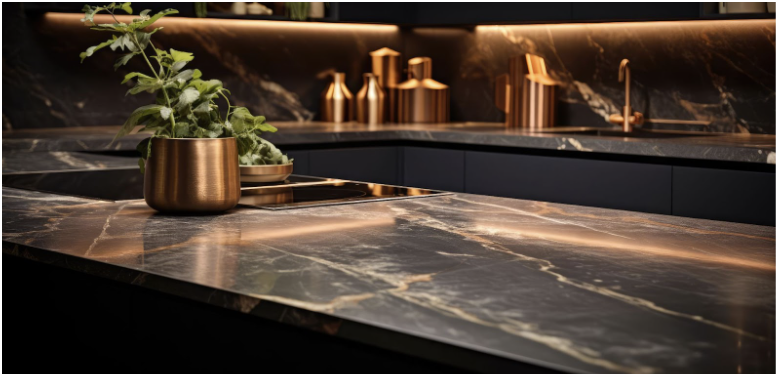
Choosing the perfect countertop installation for your kitchen remodel or bathroom renovation is a critical decision that affects both the functionality and aesthetic appeal of your space. With a wide variety of materials available, each with its own set of advantages and disadvantages, the selection process can seem overwhelming. This comprehensive guide will walk you through the key factors to consider and provide an in-depth look at popular countertop materials to help you make an informed choice that suits your needs and style.
Factors to Consider When Choosing a Countertop Material
Before diving into the specific materials, it’s important to understand the key factors that will influence your decision. Here are the main considerations to keep in mind:
1. Durability
Your countertop will be subjected to daily wear and tear, so durability is a crucial factor. Consider how the material will hold up against scratches, stains, heat, and impacts.
2. Maintenance
Some countertop materials require more maintenance than others. Determine how much time and effort you are willing to invest in cleaning and maintaining your countertops.
3. Cost
Budget is always a significant consideration. Countertop materials vary widely in cost, not only in terms of initial purchase but also installation and long-term maintenance.
4. Aesthetic Appeal
Your countertop plays a major role in the overall look of your kitchen or bathroom. Choose a material that complements your design style and personal taste.
5. Functionality
Think about how you use your countertop. Do you do a lot of cooking and food prep? Do you need a surface that can handle high heat or frequent spills? Choose a material that aligns with your specific needs.
6. Environmental Impact
For those concerned with sustainability, consider the environmental impact of the countertop materials. Some options are more eco-friendly than others, both in terms of sourcing and manufacturing.
Now that we’ve outlined the key factors, let’s delve into the specifics of various countertop materials.
Popular Countertop Materials
1. Granite
Pros:
Durability: Granite is one of the hardest natural stones, making it highly resistant to scratches and heat.
Aesthetic Appeal: Each slab of granite is unique, offering a wide range of colors and patterns that add a luxurious touch to any kitchen or bathroom.
Resale Value: Granite countertops can increase the resale value of your home due to their high-end appeal.
Cons:
Cost: Granite can be expensive, both in terms of material and installation.
Maintenance: Granite needs to be sealed regularly to prevent stains and maintain its appearance.
Weight: It is a heavy material, requiring sturdy cabinetry for support.
2. Quartz
Pros:
Durability: Quartz is extremely durable, resistant to scratches, stains, and heat.
Low Maintenance: Unlike natural stone, quartz is non-porous and does not require sealing. It’s easy to clean and maintain.
Aesthetic Options: Quartz countertops are available in a wide variety of colors and patterns, including options that mimic natural stone.
Cons:
Cost: Quartz can be as expensive as granite, sometimes even more.
Heat Resistance: While quartz is heat resistant, excessive heat can cause damage. It’s important to use trivets or hot pads.
Environmental Impact: The manufacturing process for quartz countertops can have a significant environmental impact.
3. Marble
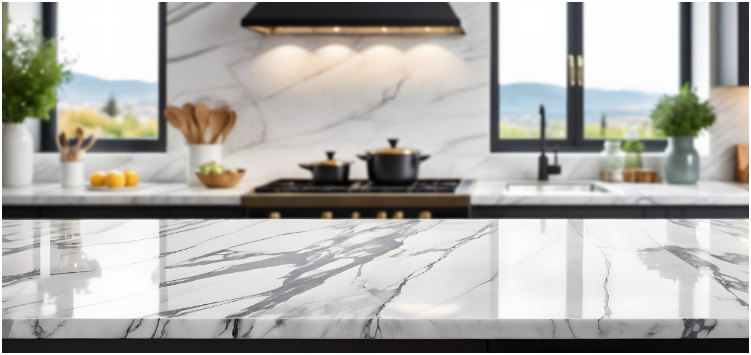
Pros:
Aesthetic Appeal: Marble is known for its timeless beauty and elegance, with unique veining and a classic look that enhances any space.
Cool Surface: Marble stays cool, making it ideal for baking and pastry preparation.
Cons:
Cost: Marble is one of the more expensive countertop options.
Maintenance: Marble is porous and prone to staining and etching. It requires regular sealing and careful maintenance.
Durability: It is softer and more susceptible to scratches and chips compared to granite and quartz.
4. Laminate
Pros:
Cost: Laminate is one of the most affordable countertop materials available.
Variety: It comes in a wide range of colors, patterns, and finishes, including designs that mimic more expensive materials.
Low Maintenance: Laminate is easy to clean and does not require sealing or special maintenance.
Cons:
Durability: Laminate is not as durable as other materials. It can be easily scratched, scorched, or damaged by sharp objects.
Aesthetic Appeal: While laminate has improved in quality and appearance, it doesn’t offer the same high-end look as natural stone or quartz.
Resale Value: Laminate countertops do not add as much value to a home as higher-end materials.
5. Butcher Block
Pros:
Aesthetic Appeal: Butcher block countertops add warmth and a natural, rustic charm to any kitchen.
Functionality: They are perfect for food prep, as you can cut directly on the surface.
Repairable: Scratches and stains can be sanded out and refinished, extending the life of the countertop.
Cons:
Maintenance: Butcher block requires regular oiling to prevent drying and cracking. It’s also prone to staining and water damage.
Durability: While it can be sanded and refinished, wood is softer and more susceptible to scratches and dents.
Bacterial Concerns: Wood can harbor bacteria if not properly maintained and cleaned.
6. Concrete
Pros:
Customizability: Concrete countertops can be customized in terms of shape, color, and texture. They can include embedded stones, glass, or other materials for a unique look.
Durability: When properly sealed, concrete is durable and heat resistant.
Aesthetic Appeal: Concrete offers a modern, industrial look that can be tailored to fit various design styles.
Cons:
Cost: Custom concrete countertops can be expensive, especially with added design features.
Maintenance: Concrete needs to be sealed regularly to prevent stains and cracks.
Weight: Concrete is heavy and requires strong support structures.
7. Solid Surface (Corian)
Pros:
Seamless Appearance: Solid surface countertops can be installed with seamless joints, creating a smooth, uniform look.
Repairable: Minor scratches and damages can be easily sanded out and repaired.
Variety: Available in a wide range of colors and patterns, including options that mimic stone.
Cons:
Cost: Solid surface materials can be relatively expensive.
Heat Sensitivity: Solid surface countertops are not as heat resistant as natural stone or quartz.
Durability: They can be scratched more easily than stone or quartz, although scratches can be repaired.
8. Stainless Steel
Pros:
Durability: Stainless steel is extremely durable, resistant to heat, stains, and water damage.
Hygienic: It is non-porous and easy to clean, making it a hygienic option for kitchens.
Aesthetic Appeal: Stainless steel offers a sleek, modern look that fits well with contemporary designs.
Cons:
Cost: Stainless steel countertops can be expensive, both in terms of material and installation.
Scratches and Dents: While durable, stainless steel can show scratches and dents over time.
Noise: Stainless steel countertops can be noisy when placing pots and pans on the surface.
9. Soapstone
Pros:
Durability: Soapstone is resistant to heat, stains, and bacteria. It is also non-porous, which means it doesn’t require sealing.
Aesthetic Appeal: Soapstone has a unique, matte finish with natural veining that adds character to any space.
Aging Gracefully: Soapstone develops a patina over time, giving it a charming, aged look.
Cons:
Cost: Soapstone is a mid-to-high-priced material.
Softness: It is softer than granite and quartz, making it more susceptible to scratches and dents. However, these can often be sanded out.
Limited Color Options: Soapstone is typically available in shades of gray and black, with less variety in color compared to other materials.
10. Recycled Glass
Pros:
Eco-Friendly: Recycled glass countertops are made from post-consumer glass, making them a sustainable choice.
Aesthetic Appeal: They offer a unique and colorful look, with various glass pieces embedded in the surface.
Durability: Recycled glass countertops are durable and resistant to heat and stains.
Cons:
Cost: They can be relatively expensive due to the manufacturing process.
Maintenance: Depending on the binder used, some recycled glass countertops may require sealing to prevent stains.
Durability Concerns: While durable, the surface can be susceptible to chipping and cracking if subjected to heavy impacts.
How to Choose the Right Countertop for Your Needs
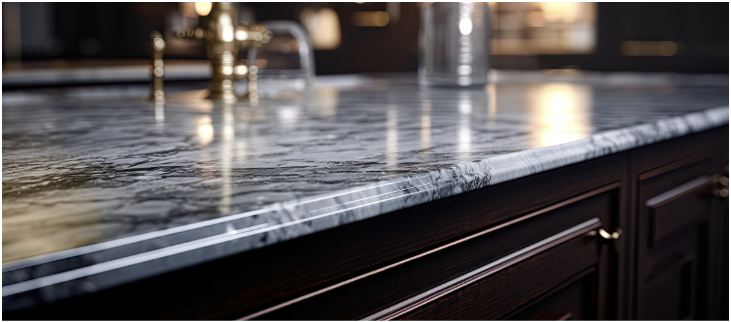
With so many options available, how do you choose the right countertop material for your specific needs? Here are some steps to guide you through the decision-making process:
1. Assess Your Needs and Lifestyle
Consider how you use your kitchen or bathroom. Do you do a lot of cooking and need a heat-resistant surface? Are you looking for a low-maintenance option? Do you prioritize sustainability? Understanding your specific needs will help narrow down your choices.
2. Set a Budget
Determine how much you are willing to spend on your countertops. Keep in mind that the cost includes not only the material but also installation and any additional maintenance or repair costs.
3. Evaluate Aesthetic Preferences
Think about the overall design style of your kitchen or bathroom. Choose a countertop material that complements your existing decor and enhances the aesthetic appeal of the space.
4. Research and Compare Materials
Look into the pros and cons of each material, considering factors like durability, maintenance, cost, and environmental impact. Visit showrooms or request samples to see and feel the materials in person.
5. Consult with Professionals
Talk to kitchen and bathroom remodeling specialists, designers, contractors, and countertop fabricators. They can provide valuable insights and recommendations based on your needs and budget.
6. Think Long-Term
Consider how the countertop will perform over time. Will it age gracefully? Is it easy to repair or replace if needed? Choose a material that will meet your needs not just now, but for years to come.
Get Started with Your New Countertop Replacement by Contacting the Kitchen Remodeling Experts in Orange County
Choosing the perfect countertop material is a significant decision that can greatly impact the functionality and aesthetic of your kitchen or bathroom. By considering factors such as durability, maintenance, cost, aesthetic appeal, functionality, and environmental impact, you can make an informed choice that aligns with your needs and lifestyle.
Whether you prefer the timeless elegance of marble, the durability of quartz, the affordability of laminate, or the eco-friendliness of recycled glass, there is a countertop material out there that’s perfect for you. Take the time to research and compare your options, consult with professionals, and think about the long-term performance of the material.
Ultimately, the right countertop will not only enhance the beauty of your space but also make your daily routines more enjoyable and efficient. With the insights provided in this guide, you’re well on your way to choosing the perfect countertop material for your home.
Subscribe to Cabinet Wholesalers's Blog



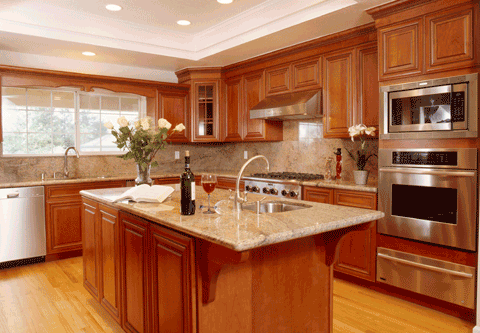
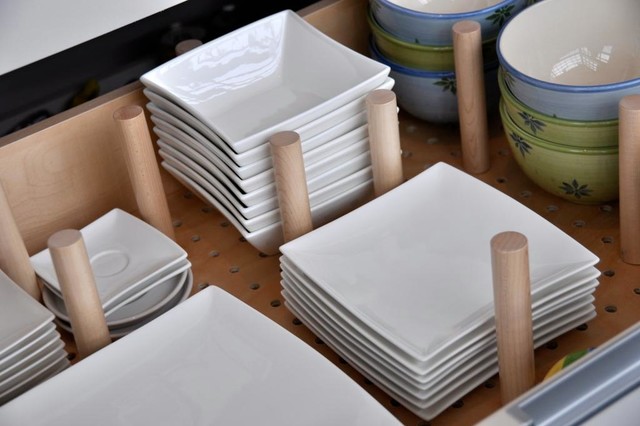





Comments